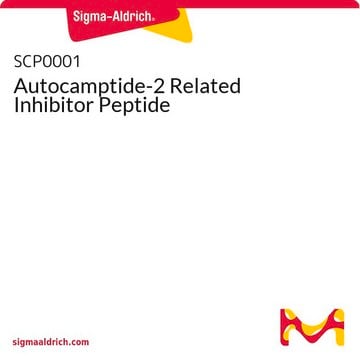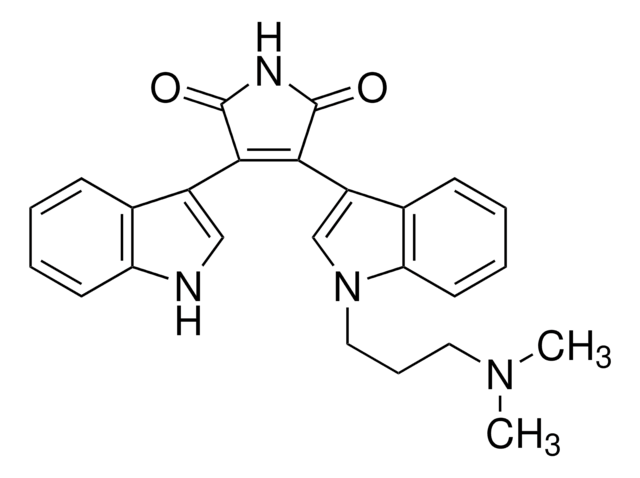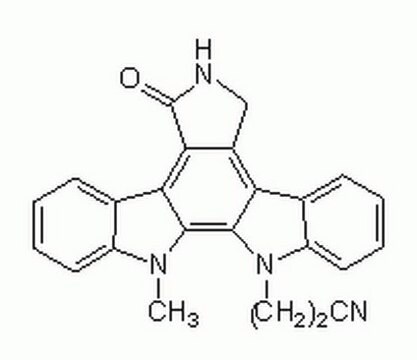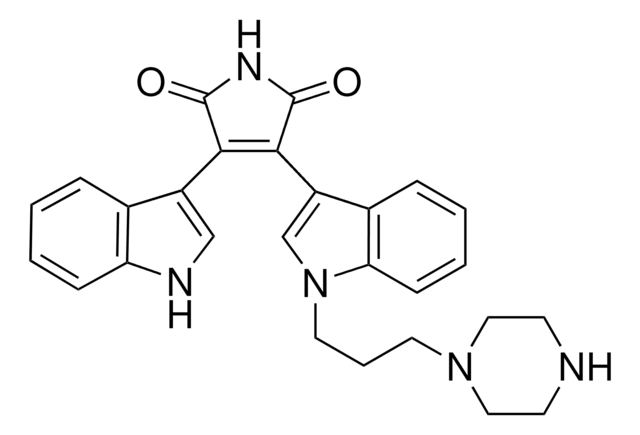203290
Bisindolylmaleimide I
A highly selective, cell-permeable, and reversible protein kinase C (PKC) inhibitor (IC₅₀ = 10 nM) that is structurally similar to staurosporine.
Synonym(s):
Bisindolylmaleimide I, 2-[1-(3-Dimethylaminopropyl)-1H-indol-3-yl]-3-(1H-indol-3-yl)-maleimide, Gö 6850, GF 109203X
About This Item
Recommended Products
Quality Level
Assay
≥95% (HPLC)
form
solid
manufacturer/tradename
Calbiochem®
storage condition
OK to freeze
protect from light
color
deep orange
solubility
DMSO: 10 mg/mL
shipped in
ambient
storage temp.
2-8°C
SMILES string
N1C(=O)C(=C(C1=O)c4c5c([nH]c4)cccc5)c2c3c([n](c2)CCCN(C)C)cccc3
InChI
1S/C25H24N4O2/c1-28(2)12-7-13-29-15-19(17-9-4-6-11-21(17)29)23-22(24(30)27-25(23)31)18-14-26-20-10-5-3-8-16(18)20/h3-6,8-11,14-15,26H,7,12-13H2,1-2H3,(H,27,30,31)
InChI key
QMGUOJYZJKLOLH-UHFFFAOYSA-N
General description
Biochem/physiol Actions
PKC
Warning
Preparation Note
Reconstitution
Other Notes
Ku, W.-C., et al. 1997. Biochem. Biophys. Res. Commun. 241, 730.
Gekeler, V., et al. 1996. Br. J. Cancer 74, 897.
Kiss, Z., et al. 1995. Biochim. Biophys. Acta 1265, 93.
Toullec, D., et al. 1991. J. Biol. Chem. 266, 15771.
Legal Information
Storage Class Code
11 - Combustible Solids
WGK
WGK 3
Certificates of Analysis (COA)
Search for Certificates of Analysis (COA) by entering the products Lot/Batch Number. Lot and Batch Numbers can be found on a product’s label following the words ‘Lot’ or ‘Batch’.
Already Own This Product?
Find documentation for the products that you have recently purchased in the Document Library.
Customers Also Viewed
Our team of scientists has experience in all areas of research including Life Science, Material Science, Chemical Synthesis, Chromatography, Analytical and many others.
Contact Technical Service
















